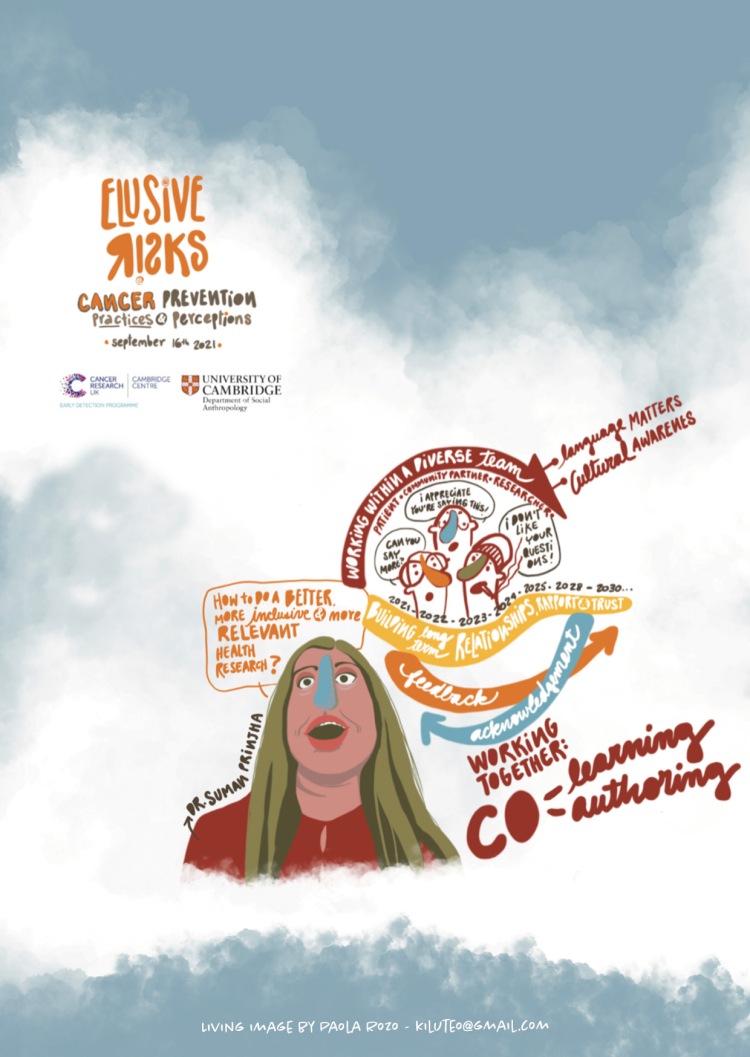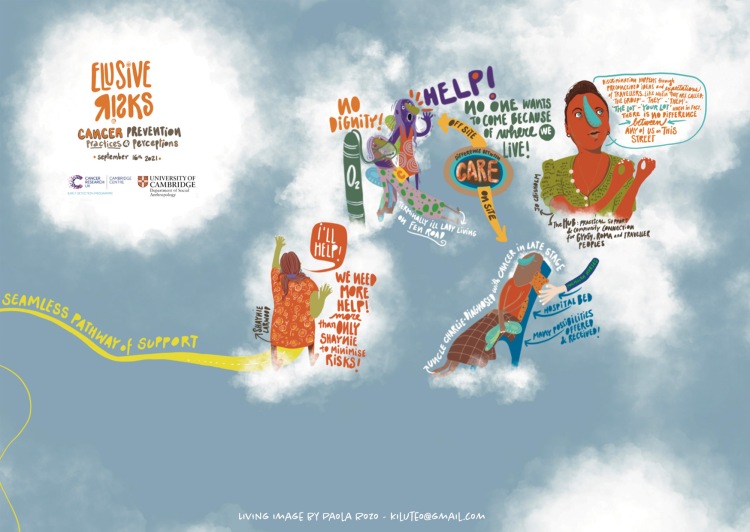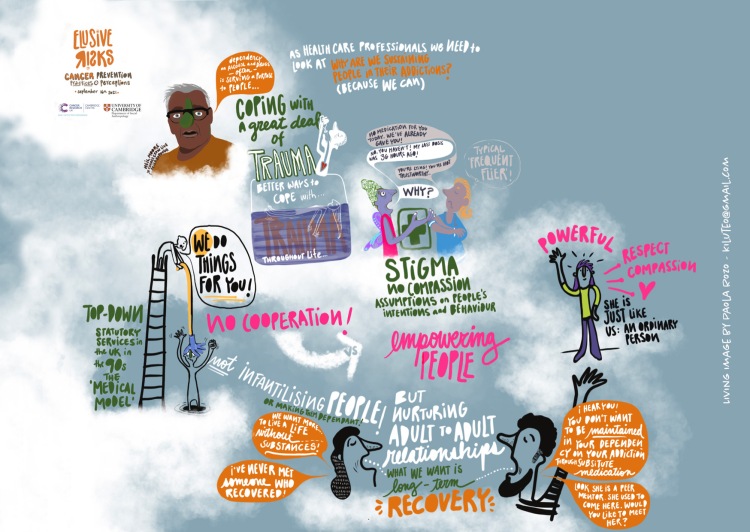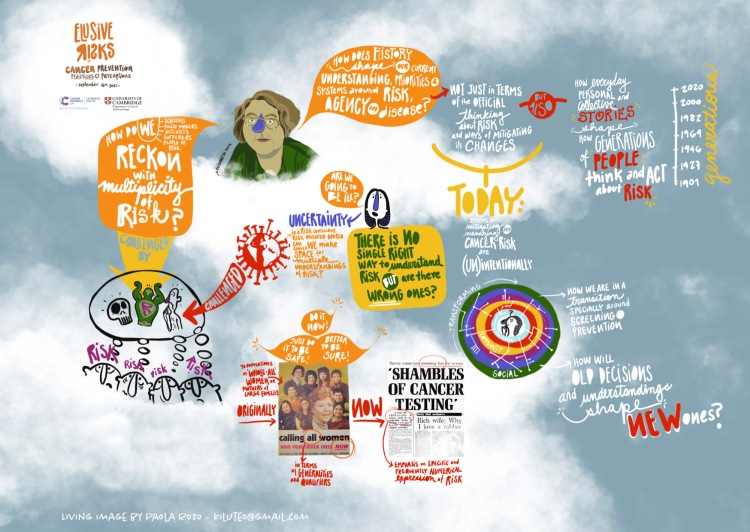The Elusive Risks Roundtable, co-organised together with Kelly Fagan Robinson, was borne out from the need to bring the different worlds of academic disciplines, healthcare specialisms, and the communities together. By doing that, we sought to tackle the elusiveness that has characterised our approaches to deal with these issues and join forces.
In pre-recorded presentations, we heard from different perceptions and practices around risk, care, and cancer however speakers defined those concepts. Living images were also created for all and each presentation to represent major themes visually.
Four overarching questions guided our event:
- What are the realities that the users of your organisation live, and what are the main health risks that they face?
- What strategies have your organisation and its users found to cope with those risks and look after oneself and one another?
- What place, if any, has ‘cancer’ in the current situation?
- What opportunities for cancer prevention can you see for your community.
On this page, you can watch the pre-recorded presentations from the nine speakers that joined us on the 16th of September 2021 at Robinson College, Cambridge.
Steve Hubbard and Jenna Bristow: Co-founders of Click Therapy CIC, Wisbech

Steve and Jenna recount personal histories of cancer diagnoses, the everyday realities of living with mental health issues in areas with little provision of services, and how funding a photography club has helped them to look after themselves and support one another.
Shaynie Larwood: Lead Nurse Gypsy & Traveller Health — Public Health Cambridgeshire

Shaynie tells us about her work with members of Gypsy Roma Traveller communities in Cambridgeshire, the importance of trust —hard-earned and easily lost— to foster relationships, and the system-wide challenges we must tackle to advance an inclusive health service.
Suman Prinjha: Qualitative Health Researcher and Psychotherapist, University of Oxford

Suman gives us essential practical recommendations to advance inclusive health research so that everyone is heard: promoting diversity in research teams, striving for long-term partnerships with communities, and providing feedback and acknowledgement.
Steven Pettican: CEO at Light Project Peterborough

Steven advocates for the creation of seamless pathways of support and inclusive environments for the rough sleeping population. Autonomy is key — having the same degree of options to accessing services as the broader population. 50% of the problem is due to systematic barriers we haven’t removed.
Stephanie Archer: Health Psychology Researcher and Psychotherapist, U. of Cambridge

Stephanie explains the rationale behind cancer risk prediction models used in the clinic. Scientists strive to improve their accuracy by including multiple sources of information. But models are still incomplete —there is more to do for these tools to benefit everyone.
Oliver Stovin: Former Macmillan GP and Joint CCG Cancer Lead in Oundle

Oliver tells us about his experience getting General Practices involved in cancer research. He acknowledges that engaging with primary care is difficult. He recommends for patient recruitment to be ethical and straightforward, and for research projects to be time-bounded.
Jolene Chisholm: Gypsy Roma Traveller Community Liaison and Hub Facilitator in Cambridgeshire

Jo recounts experiences of discrimination and the contrasting realities of people dying from advanced cancer when they live on-site —where palliative care services do not arrive— versus off-site. She suggests a few actionable points to stop excluding members of vulnerable groups.
Neil Moore: Building Recovery in the Community Coordinator at CGL – Aspire, Peterborough

Neil supports people recovering from addictions. He describes how service users are often treated by health care professionals, leading to additional risks for them. Mistrust and stigma inform the under-reporting of symptoms leading to late cancer diagnoses.
Elizabeth Toon: History and Science Communication scholar, University of Manchester

Elizabeth is a historian of science. She asks: a) How does history shape our current understandings, priorities, and systems around risk, agency, and disease? And b) How do we (as scholars, policymakers, activists, sufferers, people at risk) reckon with the multiplicity of risk?
Living Images
For the Elusive Risks Roundtable, Paola Rozo, an experienced visual facilitator, brought together our conversations and the speakers’ presentations into one big living image and individual postcards.

The living image visually summarises the main themes that speakers advanced in pre-recorded videos. Individual postcards from each speaker are shown below.










